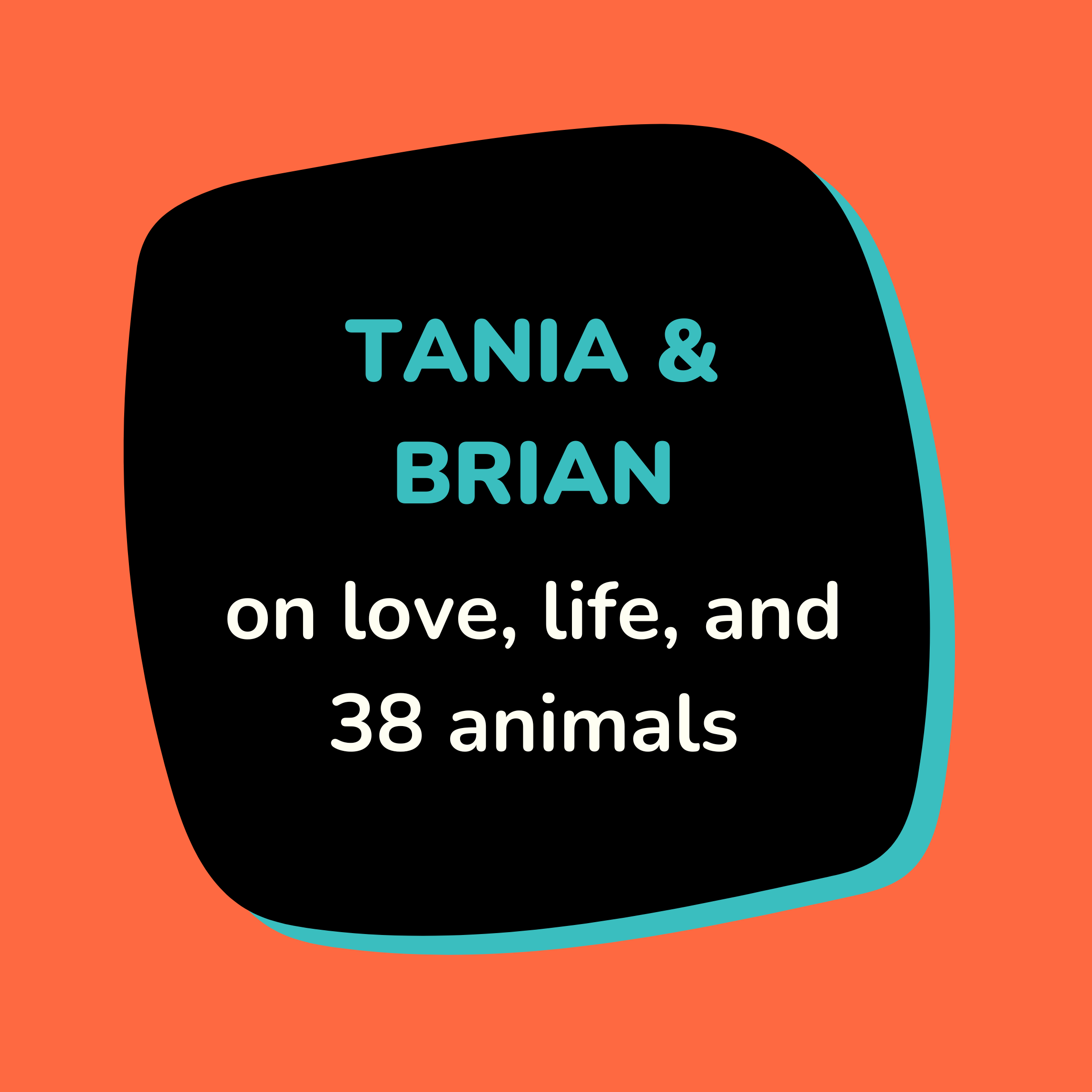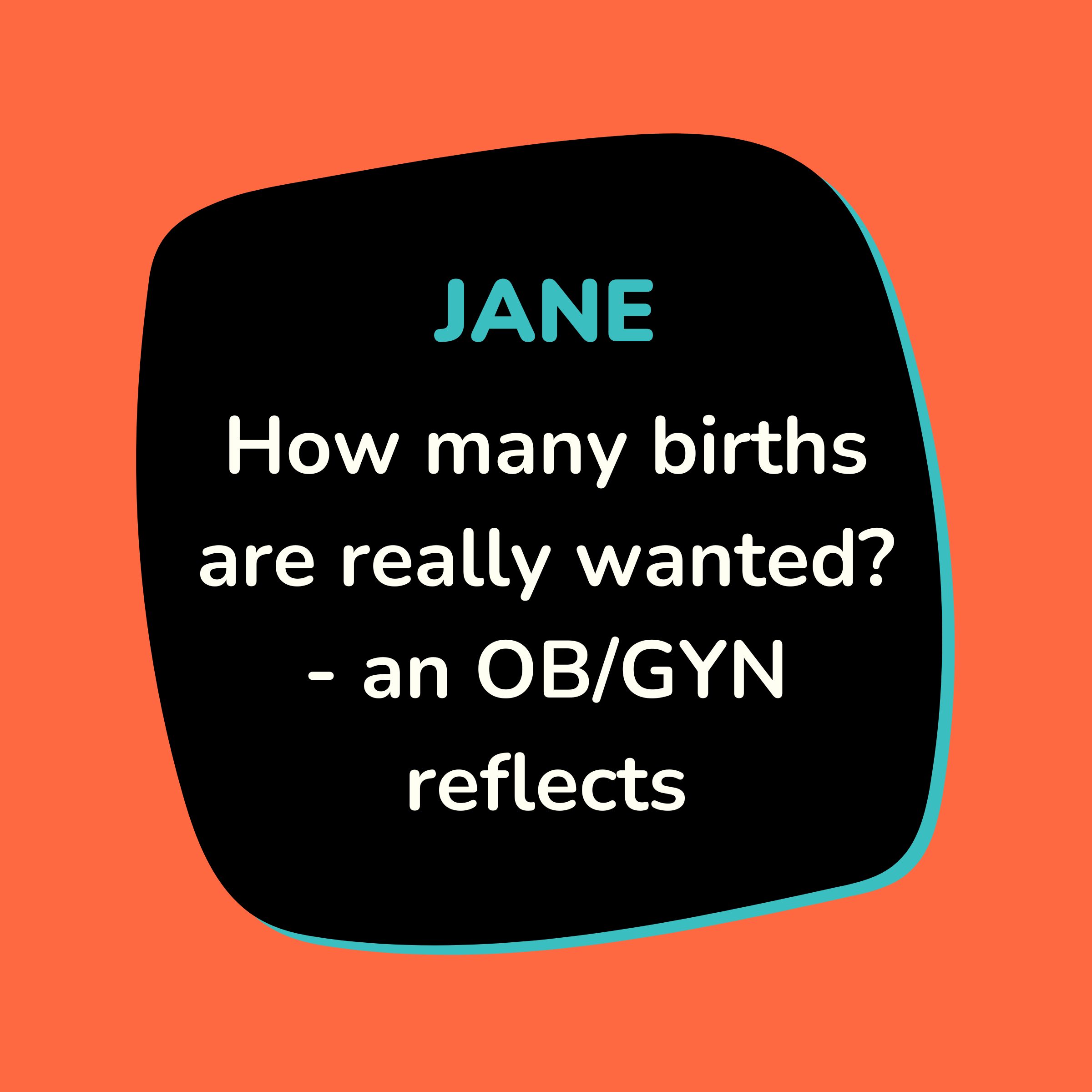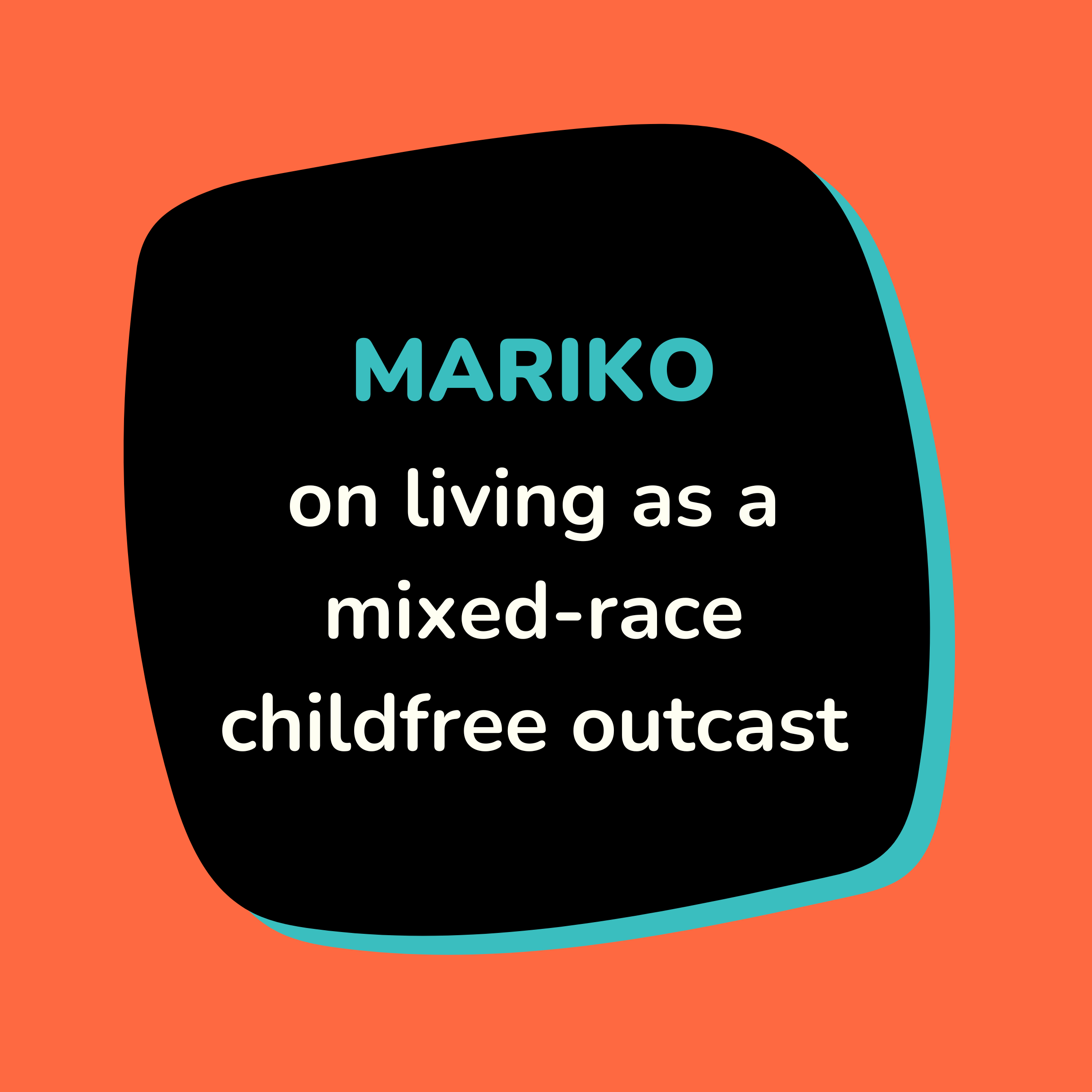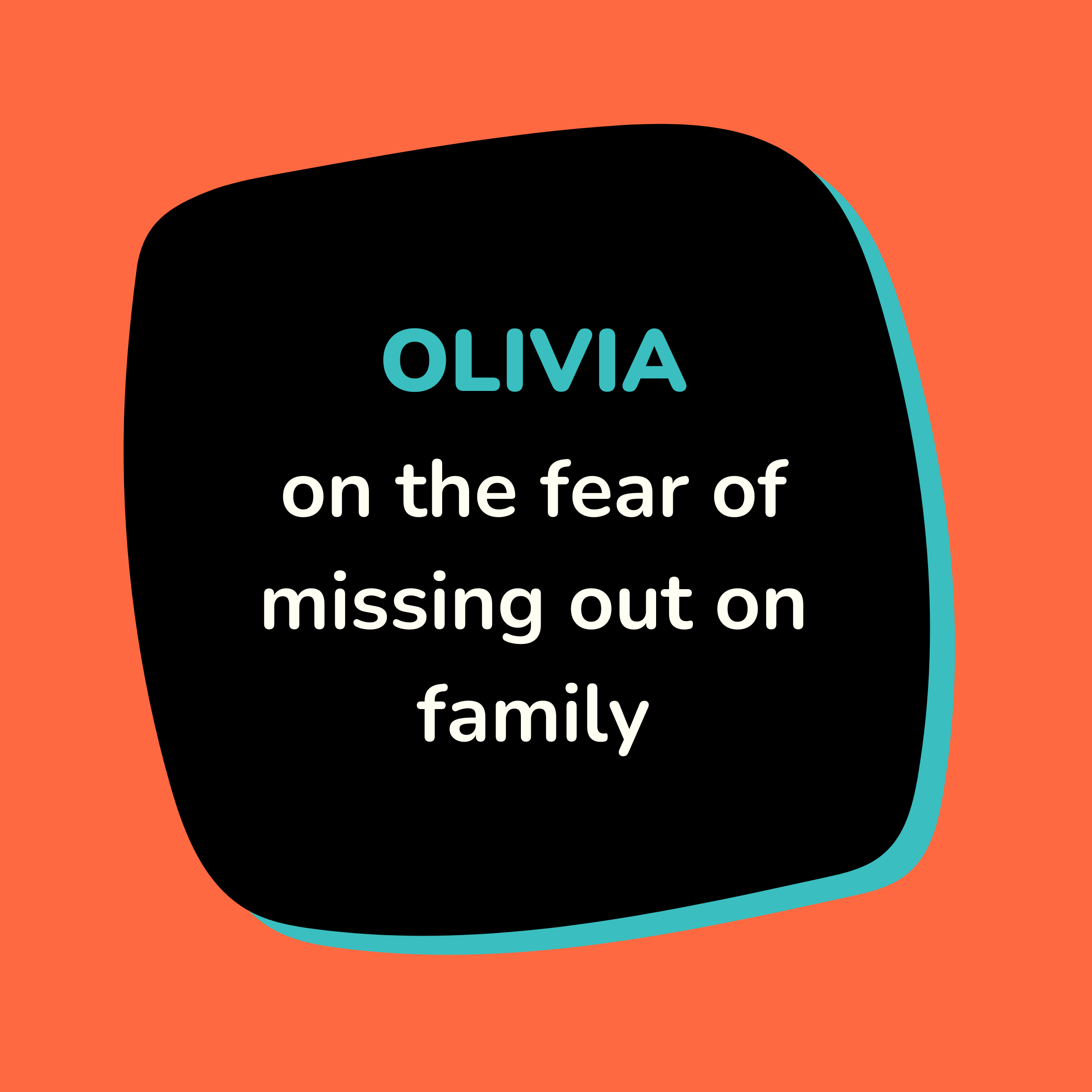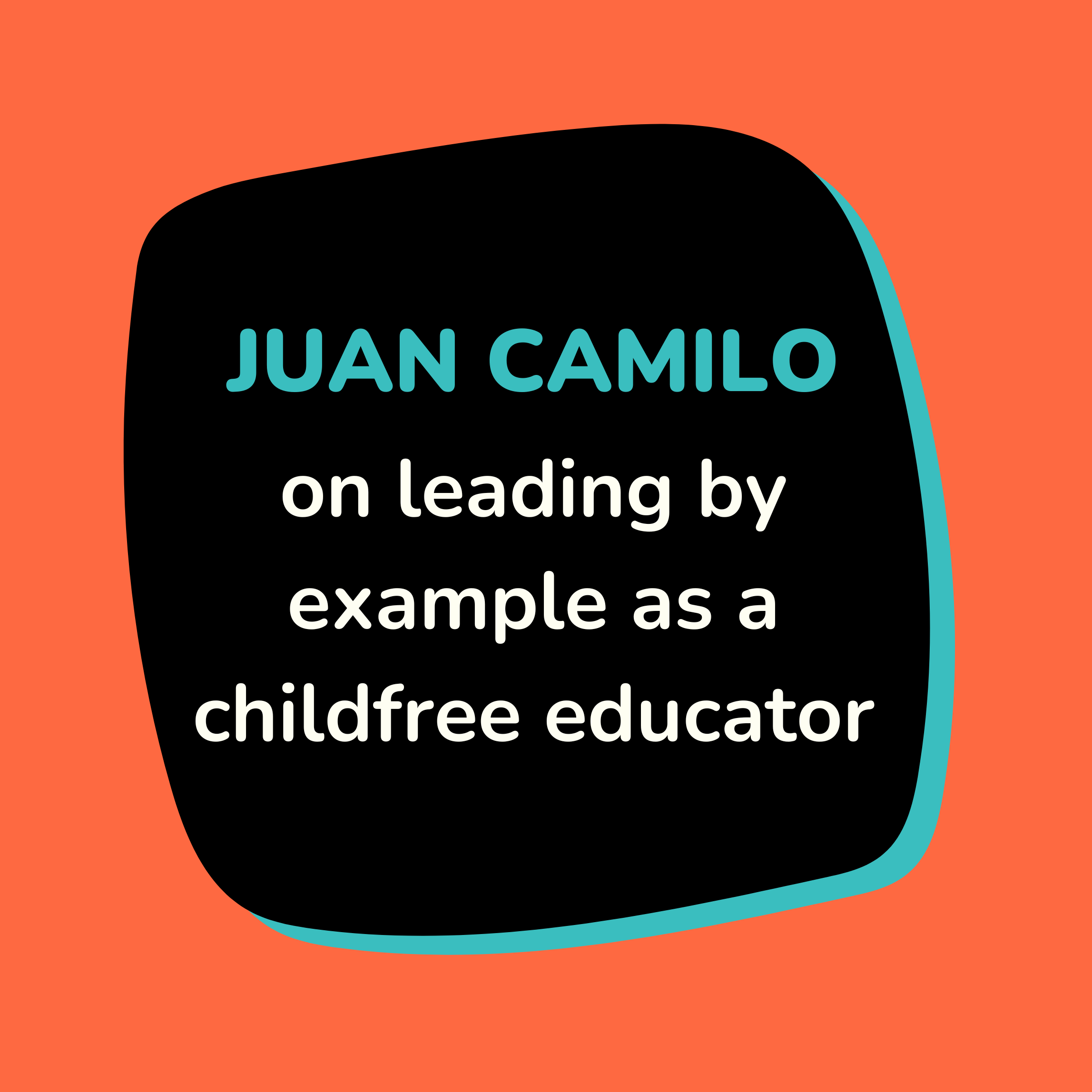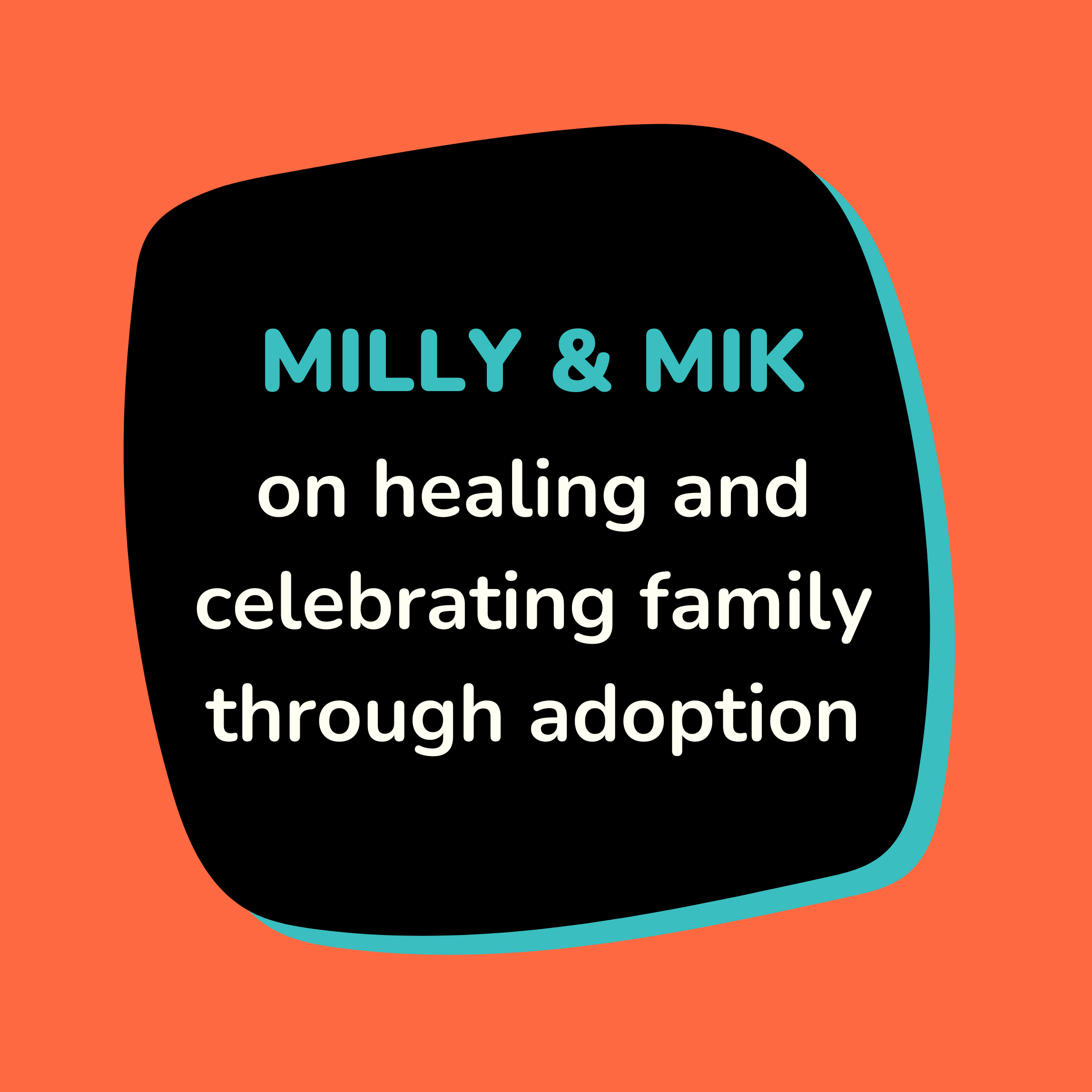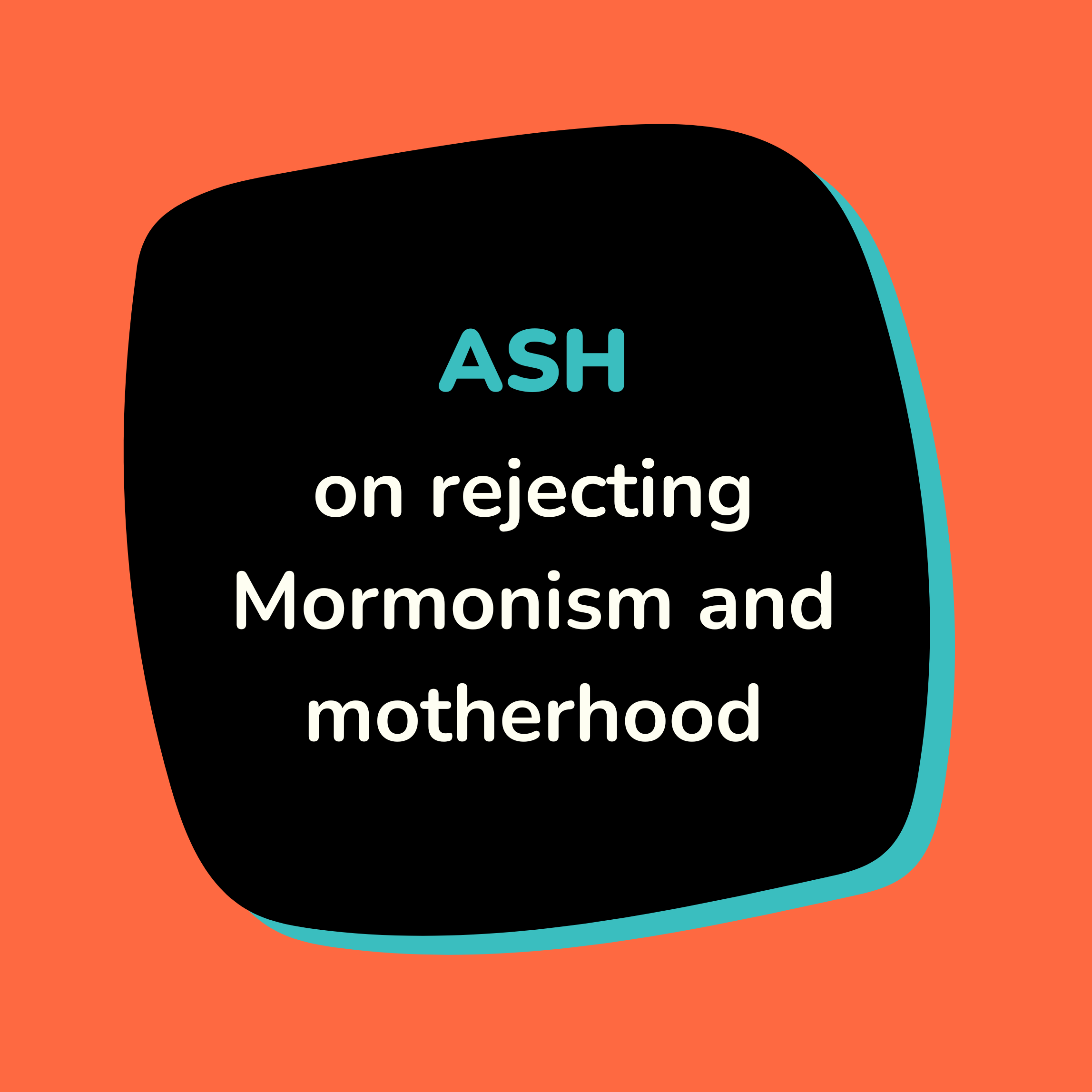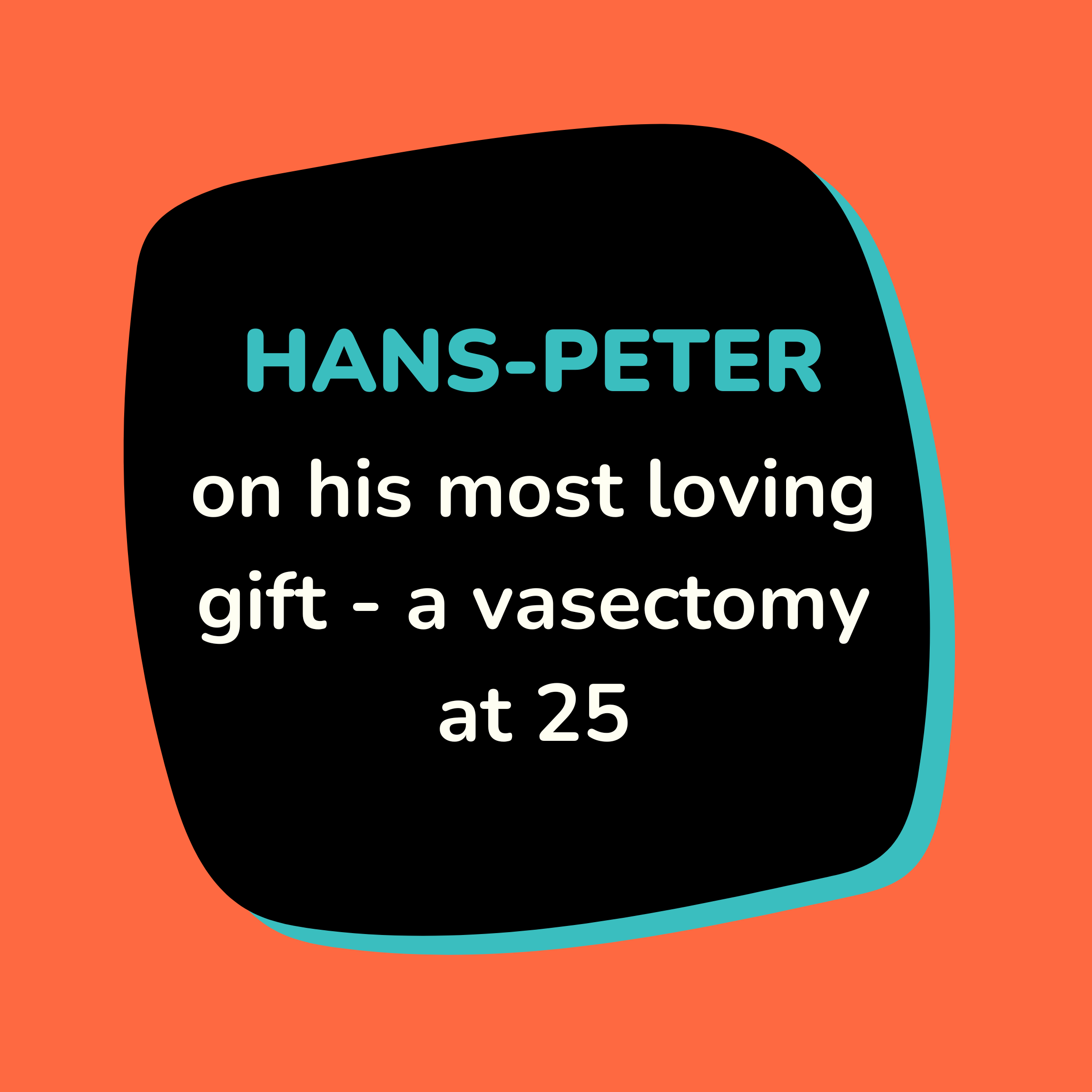Tania & Brian - on love, life, and 38 animals
Deeply in love with each other and their 38 animals, Tania and Brian — with equal parts humor and depth — share their vastly different upbringing that set them on their childfree paths. Tania and her family moved to the U.S. on asylum from Ukraine post-Chernobyl. Brian grew up in a Latino/Native American family in Texas, U.S. with severely limited resources. Their commitment to animal protection, sense of humor, and passion for creating a more humane world brought them together 17 years ago.
-
Brian 0:00
Everyone looks at families and thinks like, oh, it's going to be 3.2 kids with the picket fence and the money in the bank account. And I see the opposite of that. I see what happens when you hit rock bottom.
Tania 0:11
And one thing my mother gifted me is really encouraging me to think for myself and not assuming that just because something is a convention or someone has power that they're right. Because getting out of communism and being in this very authoritarian culture, one of the ways that she was able to keep her independent thinking is to constantly question authority and constantly question convention.
Nandita Bajaj 0:42
Those were today's guests, Tania and Brian. Hello everyone, and thank you for joining me on this journey. My name is Nandita Bajaj, and I'm the host of Beyond Pronatalism: Finding Fulfillment, With or Without Kids, an interview series in which, through intimate conversations with women and men from diverse backgrounds, I explore how they are courageously and creatively navigating pronatalism - the often unspoken pressures to have children, whether from family, friends, or the culture at large. In each episode, I dive into personal stories with people who are forging unconventional pathways to fulfillment, including redefining what family means to them, whether that means being childfree or childless, having biological kids, adopting or fostering children or animals, or creating close-knit communities of friends and loved ones. Hello, Tania and Brian. I am so thrilled to have you both on this podcast, our first episode with a couple. Welcome to Beyond Pronatalism.
Brian 1:52
Yeah. Thank you so much. Thank you for having us. Thank you.
Tania 1:55
Yeah, very excited to be here.
Nandita Bajaj 1:57
I'd like to start by asking you both to share a little bit about yourselves, about your background, your upbringing.
Brian 2:06
My name is Brian Luna, and I was born in Dallas, Texas, and raised in San Antonio, Texas, moved to New York City when I was 18 years old and studied film, theater, screenwriting, things like that. Fell in love with animals from a very young age, and that became kind of like my focus more than humans, I think. Was raised in a Latino Native American family, so there's a lot of deep culture, especially with Texas. It's very specific. We grew up really poor. My parents divorced when I was about 10 years old, so I spent most of my time growing up with my father. He and I stayed together until I moved out of the house. I flew the coop, so to speak, and moved to New York.
Tania 2:50
So I'm Tania Luna. I'm from Ukraine. Originally moved to the US when I was six years old with my mom, my dad, my grandmother and my older sister and our dog. We came here on asylum because of Chernobyl, and we stayed at the shelter that we didn't even realize was a homeless shelter. But no dogs were allowed, so we had to sneak our dog into the shelter. So right from the beginning, very committed to animals, and moved to New York, actually, the same year that Brian did in 1992 but we were different ages. Fast forward to my kind of academic interests. I fell in love with psychology and organizational Psychology in particular, went on to start several companies. Co-founded an organization called Life Labs Learning, where we did leadership training. And I did that for quite a while, until we got to sell that company. And thanks to that, that allowed me to not worry so much about the money side of things, and I got to co-found a nonprofit called Scarlet Spark, where we provide free leadership development and organizational consulting support to animal advocacy organizations. I should also say in Pennsylvania, where Brian and I live, we live with 38 other animals aside from the two of us. So we have, we think of it as like, a micro sanctuary. So we live with roosters, goats, pigs, cats and dogs and each other.
Nandita Bajaj 4:15
I love that so much. I also want to just acknowledge for you, Tania, how stressful it must be with news from home with what's going on in Ukraine right now. And also for you, Brian, just the long legacy of genocide and exploitation that communities from around the world, indigenous communities have had to experience. And I really appreciate that you both have shared your personal stories. And right off the bat, we can see that the way your family, the way it's defined, is very different. There's you both, there's all these incredible animals that you're living with. How did pronatalism show up in your own upbringing independently and even when you both got together, what were the expectations of what would make for a family?
Tania 5:12
So growing up in the former Soviet Union, it was very much the cultural norm that everyone has a family. Generally, it would be like two kids for the most part. My mother always said, like, if I knew I had a choice, I might not have had kids, she said she didn't really understand how babies were made until she got pregnant. I don't know how serious that comment is, but I think it's like 80% serious, because there was no sex education, no conversation about sex, no conversation about getting your period, nothing like that. Just a total void about any of those subjects. So I can't say that there was like a pressure, in the sense that it's not like people were saying, oh, when are you having kids, and how many kids are you going to have, and all that kind of stuff. It's just like an assumption, to be honest, I don't think in Ukraine I met a single person who didn't have children. I can't even think of meeting a person who wasn't married unless they had lost their spouse. Very recently, I started rereading the old stories of this kind of witch-like creature that's part of Eastern European lore, and her name's Baba Yaga. So she was this powerful female creature that lived in the forest and communed with animals, and had this home that had chicken legs so it could actually, like, move around and follow her everywhere. And she didn't have kids, but she would educate others and serve as this sometimes, like an unexpected mentor. You would think that she's sort of this, like, ominous being, but she would end up sending you on a quest, or teaching you something, or leaving you with some wisdom. But anyway, I do remember as a kid thinking that she was, like, incredible, and she is a big name in Eastern European fairy tales, and I think that's literally the only person in quotes I could think of who there was never talk of her being married or having kids. I don't know to what extent that impacted my thinking, but outside of fairy tales, the societal expectation was like, you have your kids so that they can serve the government and essentially serve the society. There was no talk of like, selfish, selfless? Is it for joy? Is it for good family feelings? None of that. It was like you have your child, because your duty is to serve your society, and then your kids would take care of you, and your kids were very often the people that, as you got older, you would move in with. Like my grandmother lived with us my entire life. She moved to the US with us. There was never a time that I wasn't living with my grandmother, and she was my primary caretaker, more so than my mother, and that was just very much. The expectation is that nobody moves away. Nobody kind of goes off and does their own thing. You just, if you do for university or something like that, you still come back and you kind of continue this, like, small unit of a family.
Nandita Bajaj 8:14
And was that similar in any way to how it was for you, Brian?
Brian 8:18
Yeah, so both my parents came from what I consider big families, like my mom and my dad were both the oldest of six kids. So for me, that's a big family, especially since it was just me and my brother and my sister growing up. When you take that Latino culture, I mean, some of us are born with kids. Kids are there to help with the chores, to help with the ranch. And in my mom's family, my mom became the surrogate parent because she had to take care of all of her little brothers and sisters. So just like childcare and the more kids you have, you have, like, these kind of inside babysitters, like, I didn't know what the hell a daycare was until I was much, much older, like an adult, we didn't have daycare, we didn't go into camp, we didn't do any of that. We stayed with our brothers and sisters in their hip pocket, and that's kind of what kids were for. Take care of other kids. And the societal pressure is like, every time you get a girlfriend, even in high school, the parents would jokingly be like, Oh, they're going to get married. I wonder what their kids are going to be like. For me, I knew I didn't want to have kids when I was younger, when we grew up like I said, we didn't know we were poor. You know, poor people don't know they're poor until you get around people who are not poor. But resources were always pretty finite in our house. Like, if you didn't guard your fries, someone was going to eat them, so you had to take all your food with you if you got up to the bathroom or something. So you just always felt like you were a burden. So even as a kid, I knew I didn't really want to be around other kids. At one point, I thought I was going to join the military, because for me, that was the only way I could ever afford to leave Texas. And then by the time I got accepted into an acting school in New York where other people were going to college so they can get a job and have kids and start a family, it wasn't even discussed. I didn't even have an idea for it. And I have nothing against people who have kids, so to speak. I knew it wasn't for me. So I had that pressure. I’m just blown away by, like, who's going to take care of you when you're old. That's why I got a wife who's younger than me. I'm just joking, no, but the point is, is, like, I think the questions that come at this are ridiculous, and there is a stigma where I grew up, if you don't have kids, something is wrong with you. In other words, you can't have kids, which in this machismo culture makes you less of a man. What's wrong with him? Either he is mentally disturbed, he can't physically have them, or he's not attracted to the people that can make kids. So that's the social pressures that I experienced.
Nandita Bajaj 10:42
And there's so much overlap, I think, in so many traditional communities, I mean, including the community in which I grew up, to both of your stories, there is just this expectation, especially this thing about who will take care of you when you're older. I think that trope is still repeated a lot today, even among progressives, as if children are an old age insurance policy.
Tania 11:09
Even if that was your goal, it would be so much cheaper to just save money. Like, if you find joy with having kids in your life, that's one thing. But if it's your insurance policy, I'm pretty sure just put money into your retirement account and you'll wind up on top.
Brian 11:25
That's also a terrible time to find out you were a crap parent. And then when you get old, your kids are like, bye, bye, putting you in this little hole. We're locking you up because when I was 12, you didn't get me that Barbie townhouse or whatever. So that's a terrible time to find out your insurance policy is crap.
Tania 11:40
I don't know if I was doing this consciously or unconsciously, but as my grandmother started aging, and members of her family and even Brian's family, I really started thinking proactively about what I would do with myself as I get older. I hate anyone doing anything for me out of a sense of obligation or duty. So as I was seeing older people in my life, seeing what other options were. What are the independent living places and things like that? I was just kind of already imagining myself living in a place like this and being like this looks pretty fun. Like, have you seen the activities these people do? It's amazing. I remember even in my early 20s, looking at these like senior cruise ships, where you can just sail around and have people take care of you. And I don't hate the idea of someone taking care of me if I pay them for it, because I never want to feel guilty about it. And so right from an early age, I was sort of mentally like, starting to imagine what being old and not being able to fully take care of myself looks like, so that by the time it happens, it doesn't sneak up on me. It's been important for me to almost like, make sure that's part of my vision of the future.
Nandita Bajaj 12:57
I am learning a lot more about it, because my parents, they recently joined a seniors club, and my parents are 75 and 81 and they're both relatively fit. But when I compare them to other family members in India who are their age or younger, there is this expectation that you become old, and then you internalize that, and you stop engaging intellectually, you stop engaging physically in activities that stimulate you, that keep you active.
Tania 13:30
Yeah, in Ukraine, when you reach 45-50 as a woman, people would start calling you grandma. I just assumed, right, and I remember, like, talking to my mother about the age that she is now. She's nearing her 70s, and she's like, so active, a few years ago, started weightlifting and doing yoga, and she has the most youthful energy. And so to think about what that would have looked like if we were still in Ukraine, at least for her, it just would have been draining of this energy and like the life force that she has.
Nandita Bajaj 14:03
Totally. Brian, you said you knew from a young age, and you certainly knew in high school that you were not going to have kids. And then Tania, you said you had kind of resonated with this imaginative character, who represented something different from what your culture represents.
Tania 14:22
Yeah, unconsciously, I would say, I don't think as a child, I was like, I'm going to be Baba Yega, who, by the way, Baba means grandma. So even she was called a grandma. But it was just never in me. As a little kid, I used to play with animal toys. I didn't want dolls. When I played make believe, I pretended I was a dog. When we moved to the US, they put me in this kind of kindergarten-like thing. And I said, I really don't want to be around all these children. And I was miserable because I grew up, I was very sick from Chernobyl, and so in many ways, I grew up very isolated from kids' existence up until I was probably four years old or so, and I mostly spent time with adults. So part of it might have had to do with that, like I lacked some of that early socialization with kids, other than my older sister, who was so mean. So I didn't have a lot of positive association with kids. And I remember going to kindergarten and being like this is exhausting. I feel like I have to pretend that I'm a kid this whole time. I got kicked out of first grade the first time I tried that, so I had to do first grade over because it just wasn't working for me, not just because of the kids, but also I just didn't do well with authoritarian style leadership, because I was used to adults explaining things to me and being very reasonable. And one thing my mother gifted me is really encouraging me to think for myself, and not assuming that just because something is a convention or someone has power, that they're right. Because getting out of communism and being in this very authoritarian culture, one of the ways that she was able to, I guess, keep her independent thinking is to constantly question authority and constantly question convention. So I absolutely have so much to thank her for in that regard, when it comes to not having kids and otherwise, because even though she did expect that I would have kids again without really talking about it, she also, from an early age, kind of made it okay for me, or modeled for me that we shouldn't care about what other people think, and that. Just because something's normal doesn't mean it's right. But anyway, so from an early age, didn't play with dolls, wasn't drawn to kids, didn't like being around kids. That said, when Brian and I first got together, we didn't explicitly decide that we weren't having kids, I think very much caught up in like the fresh sort of love hormones and psychology, I think we did sort of assume that we would have a kid we had probably six months to a year of being like, yeah, we'll probably have a kid, right?
Brian 16:52
Because that's what we're supposed to do, I guess. But I think you're right. It was that hormone of like, getting together, finding that person, you know, being with that person, and then you're like, obviously we want to make more of this person. But then I was like, we can just take photos.
Tania 17:06
And then we got to know each other. And then I think the moment that we did have an explicit conversation was when my sister's son, who also isn't her biological son, so our lineage stops here, but when he was a baby and she needed help watching him, and I was there all day for a few weeks, like, just miserable, if I'm honest. And Brian came to visit, and the baby finally fell asleep, and he looked so cute in his little, like, rocker thing. And he's like, swinging there, looking like a very cute baby, finally peaceful. And Brian and I just kind of looked at him and looked at each other, and we're like, yeah, we're not having kids. And it was just this really beautiful moment of total clarity and alignment. And from there on, we just, it never had to be a discussion again.
Brian 17:51
It felt final. It wasn't in the moment like, oh, we just changed the diaper. It was really disgusting. We don't want kids. We were looking at him. He was peaceful, good kid. I actually love kids, because I relate so much to them now, like I love comic books, toys, cartoons, like I'm doing it all. So one of the things I remember about that during that whole ordeal was feeling so grateful that my dad would come home. And I know that sounds crazy, but I just feel like, when we were struggling to find things to eat that night or where we were going to sleep, or any of that stuff. It would have been easier for someone just to be like, I need to take care of my life first, and then, you know, let the state take this kid, or let his mom take this kid, or someone will take him. So I was so grateful that he would come home. And I saw the struggles that my dad had, having to put food on the table, even for the night, and I'm okay now. I came out of that. I'm one of the few situations that can look back on this and learn from it, or teach something. But I saw what my dad went through, and that scared the hell out of me about having a family. I saw how tough that was. I see the work that it takes. You know, everyone looks at families and thinks like, oh, it's going to be 3.2 kids with the picket fence and the money in the bank account. And I see the opposite of that. I see what happens when you hit rock bottom. I don't want to hurt any child. I don't want to make it painful for other people. I know I can take care of myself, and I know that I can take care of these 38 animals. I'm happy with that. I love my dad. He was a great, great father, beyond great for me, because he came home every day, because he pulled us out of this and gave me the opportunities. And I have family members right now that are struggling with children financially, and it's scary and it brings up terrible memories, and I'm happy I can help them when I can.
Nandita Bajaj 19:48
Yeah, and also, as you said, a lot of what we see in mainstream culture and media, it valorizes families and large families and kids, because it only shows us the highlight reel of the good parts. It doesn't show us all the different things that you've just talked about. The individual aspect of it always gets lost in pronatalism, the rights of the children to be born into good living situations, to have their basic needs met, to have, you know, material, spiritual, psychological resources that they need to grow up.
Tania 20:27
And I think it's the emotional resources as well, right? Because I know people like Brian, who were just so incredibly loved by his dad and who had almost nothing in terms of monetary resources. And then I know people who grew up with lots and lots of money but feeling just abandoned or forgotten. And I think that's another piece that if we just think about, can you afford to have this child? It's not asking the question of, can you mentally, emotionally, afford to have the child, especially if the child doesn't turn out to be the kind of child you wanted? I used to do research on in this lab, but my colleagues were looking at what are some of the predicting factors of effective parenting, and one of their key findings was that it's not any particular parenting style. It's fit between the parent and the child, and you can't control that. You can't predict that. You don't know whether this child that's going to be born to you biologically, if you choose to go that route, is going to be compatible with you. And so it might be that this dream you had, even if you were emotionally, psychologically ready for it, it doesn't end up being the kind of individual that you want to spend time with or that thrives in your company.
Nandita Bajaj 21:41
That is such a brilliant point. There's something bigger going on in terms of who that child becomes as a person, and whether or not you get along with them or there's compatibility there. So I think both your points so clearly explain - we don't have to justify to people that you like them or you don't like them, and you know, it doesn't say anything about you as a human being. It's completely okay to simply say - I don't want them.
Tania 22:06
I mean, there's kind of two theories I have around it. One is that there's a feeling of maybe being judged, that maybe we're taking a stance against these choices, like, having kids is incredibly, incredibly hard. And I've heard from a handful of friends that there are moments where they regret it or question it, and I wonder if in those moments where you're like, Oh, what did I get myself into? This is horrible, or sometimes I've had people whose kids are grown that are like, if I had a do over, I wish I didn't have kids, even if they loved their kids. And I wonder if there's a little bit of Yeah, people may be feeling judged by that choice.
Nandita Bajaj 22:43
Totally. I think that conversation needs to be normalized, too, and that allows other people to make more conscious decisions.
Brian 22:52
Even when I go back home; I see some of my old friends, or even current friends. I have people come up to me and say, you went down the right path, like with kids, because I do get judged. I hear selfish a lot.
Tania 23:05
I would say the selfish thing is particularly interesting because I feel like the people I know who don't have kids contribute in massive ways to society, because you just have much more time pouring all of your resources and effort and energy into like one being versus many beings. That's actually one of the reasons that I think, even if I did like kids, I would really, really question Given my personal values, if that's where I would want to put my energy, because it is so important for me to spend a very big chunk of my time doing something that is improving others lives, and I would like to diversify that effort versus focus on one being.
Nandita Bajaj 23:45
Tell me, both of you, while you were kind of arriving at the life that you've created for yourself today, was there any kind of big moment where you had to push back against cultural or familial pressures around this decision?
Brian 24:00
I think T and I are both on the same page of this, where we didn't really have to navigate, like, my family kind of sees me a certain way, and I can't be influenced. You know, I've kind of beaten my own drum kind of thing, so I've never really had to, like, stave off any kind of pressures or anything. Maybe Tania might have had to as a woman.
Tania 24:19
Just taxi drivers.
Brian 24:20
Yeah, that's right. Oh my gosh. New York cab drivers.
Tania 24:23
It's like, this weird indoctrination vehicle, where, as soon as you sit down, they just ask you, how many kids? Why don't you have kids? Kids are a blessing. And then I'm like, oh my goodness, I just want to get to 72nd Street.
Brian 24:35
Yeah, I hear the same thing. Kids are a blessing. You don't know what you're missing, but, and then by the time we get off, he's like, ah, but you know what? You're better off. You know, I'm driving this thing 12 hours, you know, 18 hours a day. You're better off.
Tania 24:46
Brian and I are pretty big on boundaries and kind of putting our foot down, so we don't really leave a lot of space for questions or follow up, like we'll do, like a press conference where we're like, here's the answer here, and we will not be taking any further questions or comments for the remainder of the future.
Brian 25:06
Like even when we got married, it was a little weird. We got together in February. We moved in on our second date. We got married in December. And people were like, let me give you my two cents about why that's not right. I was like, Fine, here's your change. Because we're not changing nothing. This is exactly who we are. We're going our own way, and that's it. You shouldn't have to explain it to anyone, but if you do, it's not really an explanation, it's a statement.
Tania 25:31
So we haven't really left room or gaps or, kind of, windows for that at all, again, except for the taxi drivers, where I'm sort of trapped in there. I don't think in my whole life I've ever had a woman pressure me or encourage me to have a child, if anything. I've only ever gotten like, you know, I wish I thought of that or like, but what I get from women is, oh, because your business is your baby, oh because your animals are your babies. I'm like, No, they're not my business; my business is my business. Animals are animals. Most of them are adults, like most of them, yeah, like, you know, we have two goats. I see them as, like, my grandmothers, because they're very old goats. I don't need a substitute for a baby. And for some reason, maybe it's just like, sort of social convention, but I get very often this baby term, like, when we sold the business, people were like, oh, that must have been hard, because it's like, selling your baby. No, we got a bunch of money. It was great.
Nandita Bajaj 26:23
Another really awesome point. I think, like you said, people are trying to fit other people who haven't made the same choices into a mold that they understand. And what we're trying to do here in this conversation, we're just trying to break the mold. And so where are you at today with your life decision? You made this decision quite a long time ago. It seems like you've really settled with it.
Tania 26:48
Yeah. I mean, we've been together, what, 17 years. I'll just say for myself, really delightful to be able to pour love into our marriage. I deeply, deeply love Brian, and I would not want to share that focus and time, you know, on a bunch of kids, or even on one kid. I don't like to share that love space. I love the opportunity we have to be able to help a lot of people and a lot of animals. I love sleep, like really, love sleep. It's really important for me to get at least eight hours of sleep every night. I cannot imagine my life if I didn't have the ability to prioritize that. Yeah, and I guess so far, I've only felt a great sense of, kind of, peace and joy and gratitude for being able to have made that decision early on in our marriage, and to feel the benefits of it every day.
Brian 27:47
And for me, I’m just going to put it like this. Nandita, I have an amazing comic book room, and I don't want to share that. I don't want little hands all over, little chocolate, or whatever. But I'm very happy with the life we have, the life we've chosen, the decisions we've made. I love my animals, and I can't express how they've changed my life, how they've helped me, how they've opened me up, what they've done for me. Not to sound too poetic or anything, but they've saved a lost soul. My battles with depression. It's impossible to be depressed when a goat is taking a treat from your pocket and another one's rubbing on your head. It keeps me young. It keeps me joyful. It fills me up. And my love for Tania, like she said, I couldn't have said it better. I don't want to share that. I do with the world, but I don't want any problems or focus or draws or anything. My time with her is so valuable, because even though we live together, we don't see each other because we have so many animals. I am very grateful for the choices we've made, and to find someone out of the blue that also had the same feelings as I did towards children. I'm grateful for that, and I feel fantastic.
Nandita Bajaj 29:00
This is such a beautiful statement from both of you. I can totally feel that as you both speak your love for one another, your love for your life, and the animals that you've brought into your own home and the redefining of family that you guys are manifesting. This has been such a delightful chat, and I'm so honored that you decided to share your story with me and our listeners. Thank you so much for joining me today.
Brian 29:34
Thank you.
Tania 29:35
Thank you. Nandita.
Nandita Bajaj 29:37
That's all for today's episode. Thank you so much for listening. What did you think of this episode? Do you have your own story you'd like to share? Check out the show notes to see how you can get in touch with me. Whether you'd like to share feedback about the show or a particular episode, or whether you'd like to join me on the show to share your own story, I'd love to hear from you. Thank you so much again for joining me today as we collectively discover and celebrate the many different pathways to fulfillment beyond pronatalism. Beyond Pronatalism is brought to you by Population Balance, the only nonprofit organization advancing ecological and reproductive justice by confronting pronatalism. This podcast is produced and hosted by me, Nandita Bajaj, with the support of my production team: Josh Wild, Elisabeth Strunk, Alan Ware, and Kirsten Stade.
More like this
Share your story!
Would you like to be on the show to share your own story? We’d love to hear from you!
Join our mailing list
Subscribe to our newsletter to be the first to know when a new episode is launched.


